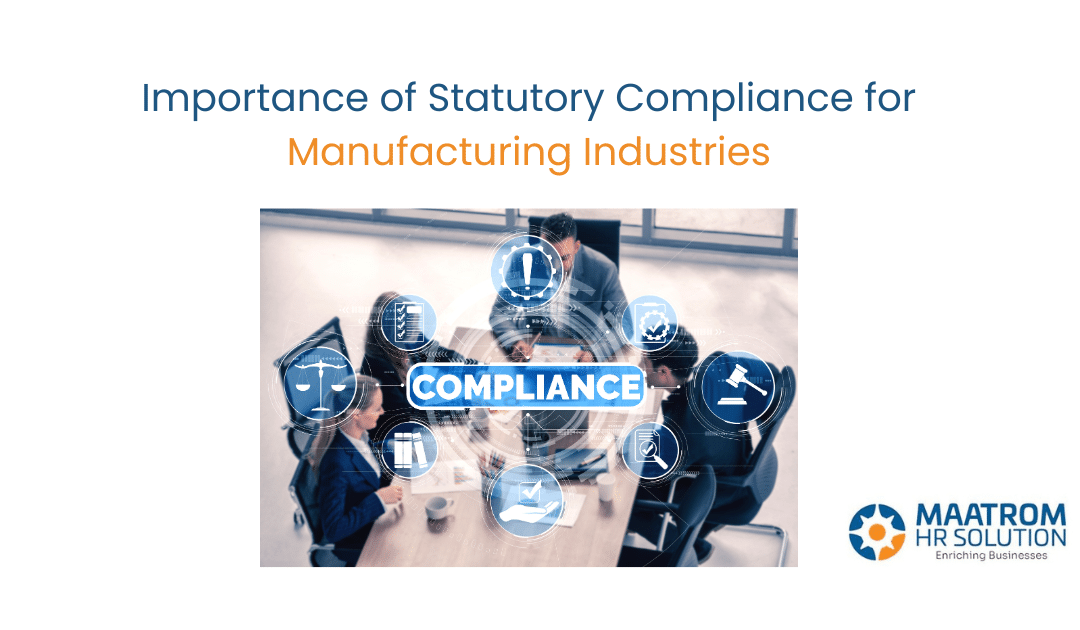Introduction
In the manufacturing sector following regulations such as payroll statutory compliance is essential not as a legal requirement but also as a crucial aspect of operational success. Many manufacturing firms find it challenging to uphold compliance due to the nature and extensive scope of applicable laws.
Failure to comply can lead to fines, legal conflicts and damage to reputation. Recognizing the significance of adhering to requirements is the step in reducing these risks and improving business longevity. Let us explore further why statutory compliance holds importance for manufacturing businesses and how it can be effectively overseen.
Understanding Legal Compliance
Legal compliance entails that businesses must abide by all laws and regulations. In the manufacturing industry, this involves following standards related to practices, workplace safety, labour regulations and product quality guidelines.
Ensuring compliance enables manufacturers to avoid consequences, uphold work environments, and meet consumer expectations regarding quality standards. Effective compliance forms the basis of integrity and sustainability ensuring that manufacturers can operate smoothly while fulfilling their ethical obligations.
Crucial Aspects of Legal Compliance in Manufacturing
- Environmental Regulations
Statutory compliance with standards in manufacturing includes adherence to rules governing waste disposal, emissions control and resource utilisation.
By following these regulations manufacturers can prevent harm to the environment. Avoid financial penalties for not complying. This proactive approach promotes sustainability and boosts the company’s reputation and adherence to laws ensuring its operations and contributing positively to environmental protection.
- Safety and Health Guidelines
In manufacturing, it’s crucial to follow workplace safety regulations. This includes meeting standards set by organisations, like the Occupational Safety and Health Administration to keep workers safe. Regular safety checks and assessments are carried out to spot and address risks in the workplace.
These measures do not prevent accidents and injuries. Also, create a secure work environment that uplifts employee morale and productivity. Adhering to safety standards helps companies steer clear of troubles, and financial repercussions while safeguarding their employees.
- Labor Regulations
Abiding by labour laws in manufacturing involves upholding labour practices such as wage regulations, working hours and anti discrimination policies. It’s essential to safeguard workers rights for an ethical work atmosphere. Maintaining these standards helps prevent conflicts at work enhancing employee contentment and efficiency.
This dedication to fairness and ethics does not foster a positive company ethos. Also ensures compliance, with legal norms shielding the company from potential legal challenges while inspiring a more motivated workforce.
- Quality Compliance
Maintaining quality standards in manufacturing is essential for meeting industry certifications such as ISO. Adhering to these benchmarks ensures that products consistently fulfill safety and quality criteria. Upholding these standards is crucial to prevent product recalls and legal complications, which could adversely affect a company’s reputation and financial well-being.
Compliance with quality norms guarantees that products are dependable and safe for consumers fostering trust and satisfaction among customers. This dedication to quality not only fulfills obligations but also establishes a company as a trustworthy and ethical presence in the market.
Challenges in Achieving Statutory Compliance
Here are the 3 major challenges in achieving compliance:
- Navigating Regulatory Complexity
Compliance necessitates comprehending and adhering to a range of regulations that vary significantly across regions and countries.
Manufacturers must navigate these intricacies to ensure all facets of their operations align, with national and international laws, which can differ concerning environmental standards, safety prerequisites and labour regulations.
- Costs Associated with Compliance
Meeting compliance criteria typically involves investments.
Expenses encompass training personnel updating equipment implementing systems and occasionally modifying production processes to meet guidelines.
For companies, these costs can significantly impact financial planning and resource distribution.
- Staying Updated
Laws and regulations are always changing so companies need to update their processes and systems.
Keeping up with rules and standards is crucial to avoid fines and ensure adherence.
This involves taking an approach, to managing compliance, which often means providing training for employees and regularly reviewing compliance procedures.
Addressing these challenges requires resources and a strategic plan to handle them effectively. Overcoming these hurdles is vital for maintaining operations protecting the company’s reputation and ensuring access to the market.
Key Takeaway
Compliance with statutes is an aspect that manufacturing industries should not ignore. It not only protects a company’s ethical standing but also improves operational efficiency and employee well-being.
With the regulatory environment becoming more complex, manufacturers must make compliance a top priority. Integrate it into their operational strategies.
If you’re seeking to enhance your compliance framework with expert guidance Maatrom HR Consultancy is available to assist. Reach out today for support, in ensuring that your manufacturing processes are both compliant and optimised for increased productivity and sustainability.


Recent Comments